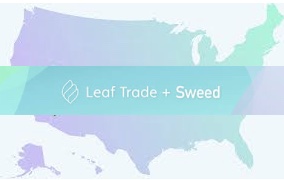breaking news
Leaf Trade, Sweed to Merge Into ‘B2B2C’ Cannabis Tech Platform
The Florida Phoenix reports
More than 20 states have passed similar restrictions on hemp products
Hemp entrepreneurs from all parts of Florida have made the trek twice to Tallahassee this month to testify against a legislative proposal that they say poses an existential threat to their livelihoods.
At the same time, states around the country have been enacting regulations regarding intoxicating hemp-derived cannabinoids, and that’s become a conundrum for all sides of the hemp debate.
Florida’s hemp program went into effect in 2019, shortly after the passage of the 2018 farm bill, which made hemp production and distribution legal under federal law and allowed states to create hemp programs. The farm bill defined hemp as the cannabis plant with one key difference: hemp cannot contain more than 0.3 percent of THC, the compound in the plant associated with getting you high.
The most lucrative part of the hemp industry has involved the production of biomass that contains cannabidiol (CBD), a non-psychoactive compound believed to treat health conditions like anxiety, stress, anxiety and inflation.
But a new measure introduced in the Florida House this spring (HB 1475) would limit the amount of THC in hemp products to not exceed 5 milligrams per serving or 50 milligrams per package and prohibit those products to anyone under the age of 21. The Senate version calls for such products not to exceed 0.5 milligrams per serving, or just 2 milligrams per package.
Completely ineffective
Vendors and patients say those levels are far too low and would make hemp products like gummies, CBD pre-rolls and oils and tinctures completely ineffective.
“I have lupus and tremors and it’s one of the reasons why I got into this business, so that I could make sure that the medicine that I received was the best and top quality,” says Shaina Ortiz, the CEO of Siesta G based in eastern Hillsborough County.
“I operate on about 1,000 milligrams a day of hemp-derivative products. All different spectrums of that hemp derived products. This bill essentially would knock out any form of hemp, CBD’s, HHC’s (hexahydrocannabinol) CBN (cannabinol). The whole entire plant.”
Matt Schwarmann, the vice president of Outpost Brands, a Daytona Beach hemp manufacturer with 142 employees, says the current packaging limits would eliminate “virtually every hemp product” on the market.
“Every vape and cartridge would all be eliminated, and when you have gummies of such small efficacy doses, less than 5 milligrams – that’s not enough for the majority of people who are using it strictly as therapeutic uses,” he says.
Their fears are not unfounded, says Nikki Fried, now chair of the Florida Democratic Party.
“The exact intent of this bill is to eliminate 189,000 jobs and 10,000 small businesses,” the former state Agriculture Commissioner told the Phoenix.
What about Delta-8?
Overall, the bill calls for hemp products to be illegal for anyone under 21 years of age; it requires packaging, labeling and testing requirements for hemp-based products; it requires that hemp products be sold in a container that is “not attractive to children” and is designed to minimize exposure to light and high temperatures; and puts limits on doses and on the packages.
It’s that last provision which is raising serious concerns.
One of the main products that legislators want to regulate is what is known as Delta-8, which is legal and soared in popularity in 2020 at hemp and CBD stores around the country.
But Delta-8 also has psychoactive and intoxicating effects, says the FDA, though those who have consumed it say that it provides a lighter and more relaxed feeling and is ideal for those who don’t want to get high from medical cannabis.
Nevertheless more than twenty states have banned or restricted Delta-8 use in the past two years.
“Some will say that this bill will end the hemp industry,” Florida Agriculture Commissioner Wilton Simpson said. He was at a press conference in the Department of Agriculture’s office in the Capitol last week next to a display of photos of high-THC products that had been discovered in convenience stores by agriculture inspectors.
“Let me be clear – the current wild, wild west situation, selling anything to anybody, is going to end. We will close the loopholes in state law being exploited to sell euphoric recreational cannabis products without restrictions,” Simpson said.
The black market
Carlos Hermida is the owner and manager of Chillum Glass Gallery and Hemp Dispensary that’s based in the heart of Ybor City in Tampa.
Read more at
Florida hemp industry fears for the worse as regulations loom
Source link

